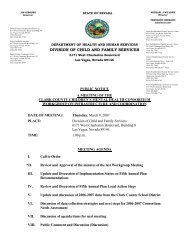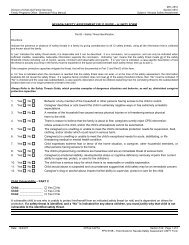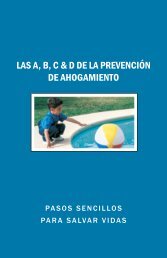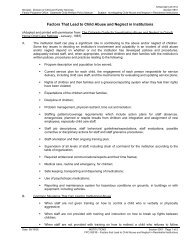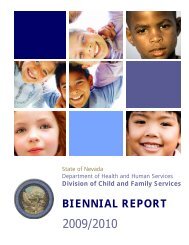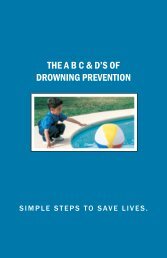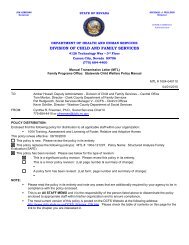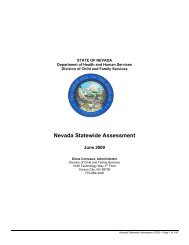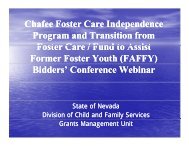STATE OF NEVADA - Division of Child and Family Services
STATE OF NEVADA - Division of Child and Family Services
STATE OF NEVADA - Division of Child and Family Services
You also want an ePaper? Increase the reach of your titles
YUMPU automatically turns print PDFs into web optimized ePapers that Google loves.
appropriate services <strong>and</strong> support them through their involvement with the legal system related to the domestic<br />
violence. This project was so successful that a second advocate was added in a subsequent year.<br />
• The Regional Partnership Grant (RPG) provides treatment options for mothers, <strong>and</strong> their children, involved with child<br />
welfare <strong>and</strong> who are abusing methamphetamines in Clark County. The program allows the mothers to access<br />
intensive in-patient substance abuse treatment while remaining with their children. To date, the program has served<br />
38 families with a total <strong>of</strong> 59 children. An additional component <strong>of</strong> the program has been an extensive cross training<br />
program with child welfare staff related to substance abuse. Multiple modules were developed <strong>and</strong> implemented to<br />
include opportunities to staff cases with substance abuse treatment staff to facilitate appropriate referrals <strong>and</strong><br />
treatment expectations. The program is in Year three <strong>of</strong> a five year grant.<br />
• During 2009, Caseworker Visitation funding was utilized to increase the frequency <strong>of</strong> monthly visitation through<br />
enhanced technology <strong>and</strong>/or additional hours for caseworker visitation. In addition, Adoption Incentive Funding was<br />
utilized to increase the number <strong>of</strong> social summaries <strong>and</strong> home studies completed to facilitate timely permanency for<br />
children.<br />
• Differential Response in Nevada was first implemented as a pilot program in two Las Vegas <strong>Family</strong> Resource Centers<br />
beginning in February 2007. In 2008 the program was exp<strong>and</strong>ed to include Elko (1 location) <strong>and</strong> Washoe (2<br />
locations) Counties <strong>and</strong> two additional centers/service areas in Clark County (total <strong>of</strong> 4 locations). The program was<br />
further exp<strong>and</strong>ed in 2009 to include: Carson City, Lyon County, Storey County, Churchill County <strong>and</strong> Nye County.<br />
• During 2009, Casey <strong>Family</strong> Programs has provided funding for a number <strong>of</strong> projects designed to address foster care<br />
related issues with the goal <strong>of</strong> safely reducing the number <strong>of</strong> children in foster care. Projects have included several<br />
key trainings, consultation on increasing the State’s penetration rate to maximize IV E funding, <strong>and</strong> the expansion <strong>of</strong><br />
the Differential Response Program.<br />
• The <strong>Division</strong>’s Grants Management Unit (GMU) has implemented an online reporting system that is used by providers<br />
<strong>and</strong> the <strong>Division</strong> to track performance indicators, client utilization <strong>and</strong> demographics. During the past year, this<br />
system has been exp<strong>and</strong>ed to track provider services that have a waiting list.<br />
Despite continued efforts on this item, Nevada still has challenges with accessibility to services. As mentioned this is<br />
primarily due to funding. However, distance <strong>and</strong> other resources also play a big factor in the success <strong>of</strong> this item. The<br />
DCFS – Rural Region in particular is challenged by lack <strong>of</strong> available providers in the small communities across the state<br />
<strong>and</strong> significant distances to the urban <strong>and</strong> metropolitan areas that may be able to provide these services. Clark <strong>and</strong><br />
Washoe Counties have the challenge <strong>of</strong> lack <strong>of</strong> resources <strong>and</strong> in some cases significant waiting lists for services. This<br />
item continues to be an area needing improvement for Nevada.<br />
Item 37: Individualizing services<br />
Goal: The State will ensure that the services in the State’s Service Array are individualized to meet the unique needs <strong>of</strong><br />
children <strong>and</strong> families served by the agency.<br />
One objective in this area is that the State, in collaboration with the <strong>Child</strong> Welfare Agencies <strong>and</strong> service array providers,<br />
will develop an ongoing process for assessing <strong>and</strong> addressing the needs <strong>of</strong> children <strong>and</strong> families within the system <strong>and</strong><br />
providing a continuous quality improvement process for ensuring that the identified needs <strong>of</strong> these individuals are met.<br />
Several efforts have been made in this area.<br />
For example, collaborative relationships/initiatives such as Differential Response <strong>and</strong> the RPG project enhance the<br />
provision <strong>of</strong> individualized services. In addition, the Youth Advisory Board (YAB) has been formed to assist foster <strong>and</strong><br />
former foster youth to make the transition to adulthood. The purpose <strong>of</strong> the organization is to provide exemplary<br />
leadership <strong>and</strong> empowerment opportunities for youth who have or will experience out <strong>of</strong> home care. The YAB started<br />
meeting in January 2007 <strong>and</strong> continued to meet throughout 2009.<br />
During 2009 DCFS developed several new UNITY screens related to service array that will provide additional information<br />
on services that children <strong>and</strong> families are referred to, including information about access/barriers such as waiting lists.<br />
These screens were operational in April 2009.<br />
Several other groups are available that help Nevada to individualize services for families. For Foster <strong>and</strong> Adoptive<br />
families there are two groups, these are the Sierra Association <strong>of</strong> Foster Families (SAFF) <strong>and</strong> the Clark County Foster<br />
<strong>and</strong> Adoptive Parent Association (CCFAPA). SAFF is a non-pr<strong>of</strong>it organization in Washoe County comprised <strong>of</strong><br />
caregivers whose purpose is to ensure licensed foster/adoptive families have the information, tools <strong>and</strong> support they need<br />
Nevada APSR – SFY 2010<br />
Page 66 <strong>of</strong> 108



